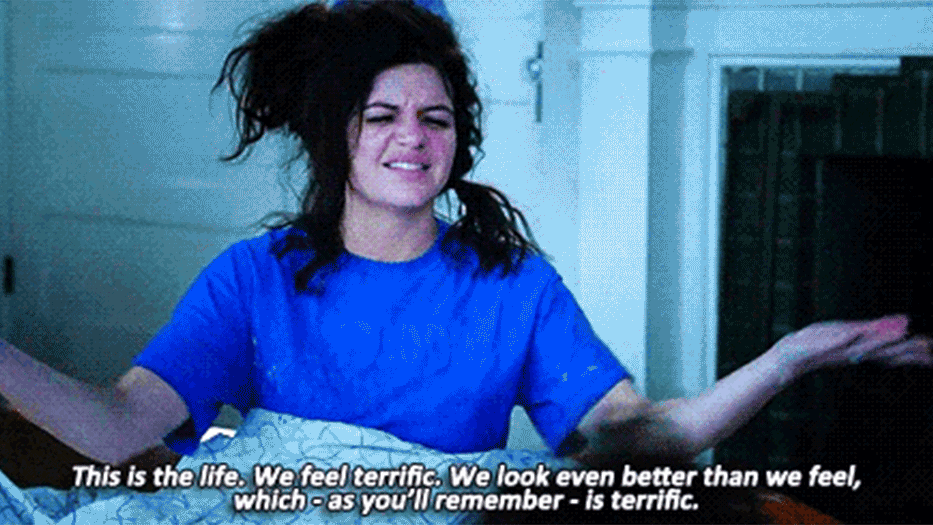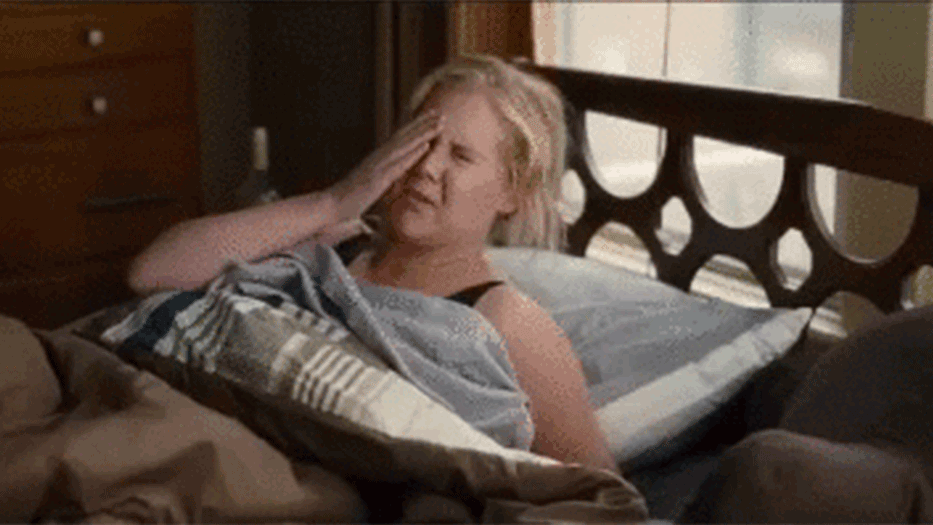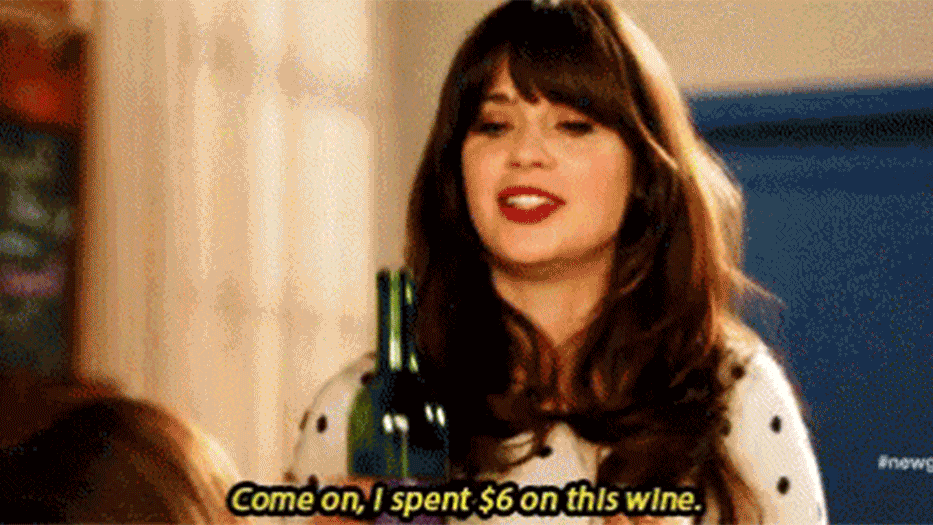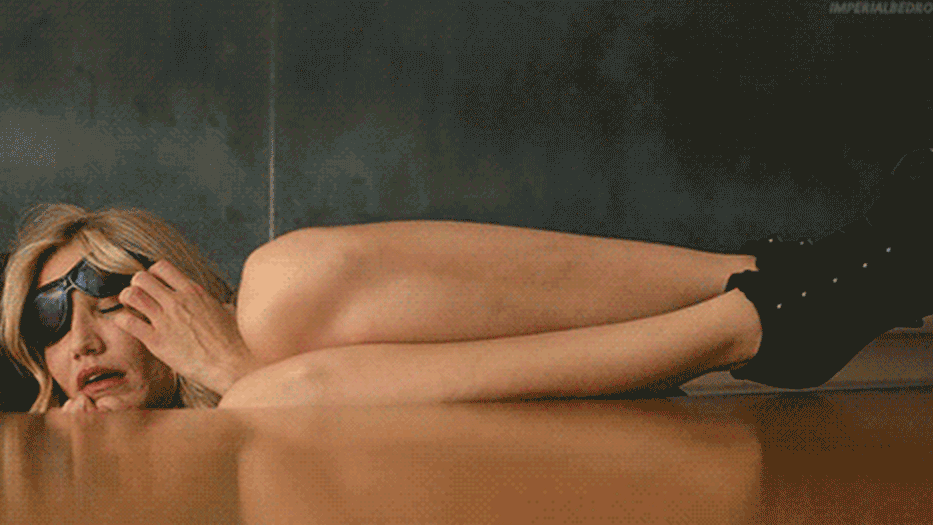Why Do I Always Wake Up Early After a Night of Drinking?
Sure, you might crash hard after a night of drinking — but you may also find yourself waking up bright and early (too bright, too early) come Sunday morning, even if your body needs sleep more than ever. So, what gives? First, let's look at the effects of alcohol on the body and how it connects to your sleep.

Photo: hcory/Tenor
How Drinking Messes with Your Body
"Alcohol introduces toxins into the body, which can cause short- and long-term damage," explains John Mansour, pharmacist and founder of B4, a vitamin supplement designed to help combat hangovers. Your body responds by diluting the toxins, breaking them down, and trying to get them out of your body, stat. But if you're drinking continuously over a longer period, your body can't get rid of the toxins as quickly or efficiently.
Then, when you wake up at the crack of dawn, you're probably dealing with a wicked hangover. "Side effects include dehydration, dry mouth, headache, light and sound sensitivity, upset stomach, lethargy, sleep deprivation, dizziness, muscle cramps, and general malaise," he says. These symptoms surface because your body is using its stored supply of vitamins, minerals, electrolytes, and other essentials, to help fight the toxins that have entered your body from drinking.
Severe dehydration and heavy alcohol consumption actually cause your brain to shrink temporarily, which can pull on the nerves attached to your skull and result in a pounding headache, Mansour says. Plus, frequent urination expels sodium, potassium, and other elements and minerals needed for proper nerve, muscle, and general cell function, he adds.

Photo: Trainwreck/Giphy
So Why Do You Wake Up So Early?
There are a few reasons you can't sleep in as late as you'd like. For one, your sleep cycle gets messed up. "You have two types of sleep: non-rapid eye movement (NREM) and rapid eye movement (REM)," says Mansour. REM sleep is where you go into a lighter, dreaming state, and these short intervals are mixed in between deeper, NREM sleep, which restores the mind and body and repairs muscles. Your body goes through cycles of the two types during the night, and each time you go into REM sleep, the interval gets longer (the first can be just 10 minutes, the last can be almost an hour).
"When you drink, you actually fall asleep faster and go into deep sleep faster," he says, so your initial bit of sleep might feel amazing. But disruptions to your sleep cycles (keep reading to understand why those happen) ruin the natural transition between REM and NREM, and as a result, you don't get as much REM sleep. And, actually, studies show that disrupted sleep actually makes you feel worse in the AM versus just not getting enough sleep.
While your sober sleep may be disrupted by the occasional bathroom run, your drunk shut-eye has even more potential interruptions, thanks to your body's attempts to process the alcohol while you're asleep: For one, a chemical process called glutamine rebound can stimulate your body and wake you up, says Mansour.
What's glutamine, you ask? It's the most abundant amino acid in the body and plays a part in a variety of bodily functions, including intestinal health, immune function, and stress management. "After surgery, for example, glutamine is administered to improve the healing process by boosting immune function and reducing inflammation," says Mansour.
"When you drink, your body stops producing glutamine but doesn't stop using it. When the alcohol is cleared, your body realizes it's lacking glutamine in a major way, and this causes your body to quickly produce and distribute glutamine through the body to make up for the imbalance," he says. This glutamine rush has a stimulatory effect and can wake you up.
Then, there's your bladder. "Your bladder is trying to remove your toxins from the system," he says. So, even though you may be dehydrated, your body might wake you up for several bathroom runs during the night and early in the AM in an attempt to flush out all the yuck.
Interestingly enough, you could find yourself snoring or having respiratory problems, too, which can wake you up: "The sedative properties of ethanol cause the upper airway to relax, making it more likely a person will snore or even have sleep apnea. This can frequently disrupt sleep, particularly in the early morning hours," explains Dr. Jeffrey Ellenbogen, M.D., a neurologist and sleep specialist.

Photo: New Girl/Tenor
Are All Alcohols Equal?
All types of drinking alcohol are fundamentally made from ethanol, and the body breaks that down the same way, regardless of whether it's vodka, beer, or bourbon — so your plans to sleep late can be foiled no matter what your drink of choice.
That said, darker alcohols contain contaminants, or congeners, which are produced during the alcohol fermentation process that can contribute to the sucky aftereffects of drinking alcohol. Some congeners include methanol, acetone, and tannins. These congeners give alcohol a darker color, which is why clear alcohols tend to be purer, says Mansour. (Try these healthier alcohols to avoid horrible hangovers.)
"These contaminants give your body more to process while it is already under stress, so darker alcohols may worsen the aftereffects of drinking (including disrupting your sleep)," he says. Stick with lighter, clearer liquors if you're having trouble (or particularly wicked hangovers) come morning.

Photo: Giphy
Tips to Sleep (When You're Not Sober)
The best way to have longer, more restful sleep after drinking is to prepare your body in advance. That means giving it the crucial vitamins, minerals, amino acids, antioxidants, and other essentials to help combat the incoming toxins. "This gives the body what it will need to process and remove alcohol from the system, as well as what will be depleted during the process," says Mansour. (He created his product, B4, with ingredient levels specifically formulated to help your body efficiently process the alcohol out of your system.) "Because hydration is such an issue, we not only added the fluid your body needs, we also added a sodium-potassium blend based on rehydration salt, which helps the body keep more fluid versus flushing it out," he explains.
You can also grab a sports drink or other electrolyte beverage to stock up on electrolytes to fight dehydration and provide the body with nutrients. Keep in mind it's important to hydrate before, during, and after drinking alcohol, he says. Aim for a glass of water for every alcoholic beverage.
The goal is to prepare and protect your body in advance, so you can enjoy a few drinks and wake up feeling better in the morning and with longer sleep. And try to stop drinking about two or three hours before bed, so your body can get a head start on flushing out all that alcohol.

